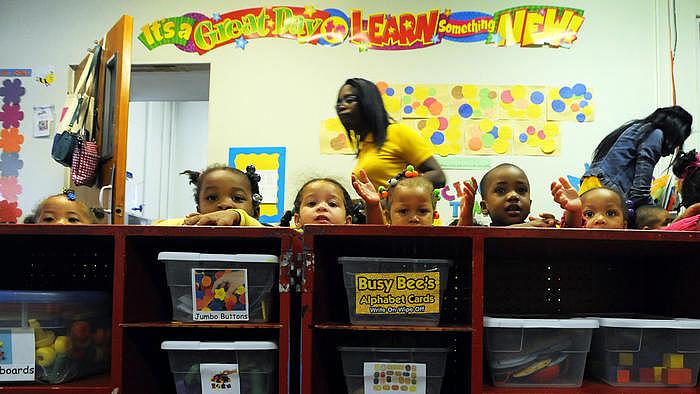More must be done to address aftermath of city violence, advocates say
For more than a year, Baltimore Sun reporter Andrea K. McDaniels and photographer Lloyd Fox have examined the unseen impact of violence — on children, caregivers and victims’ relatives. McDaniels wrote the articles while participating in the 2014 National Health Journalism Fellowship, a program of the USC Annenberg School for Communication and Journalism.
Other parts in the series include:
Collateral Damage: Advocates aim to save Baltimore children from impact of violence
Collateral Damage: Families struggle to care for victims of violence
Collateral Damage: Relatives of Baltimore murder victims struggle with grief

Lloyd Fox / Baltimore Sun Children wait for their next activity at Little Flowers Child Development Center. Located in the Upton/Druid Heights neighborhood, many of the children at Little Flowers are exposed to a variety of stressors, whether inside or outside the home, including violence.
More needs to be done to address a hidden toll of violence that is creating a ripple of social ills in Baltimore, including hurting children's ability to learn, community advocates and health professionals say.
The Rev. Frank M. Reid III of Bethel AME Church in Upton/Druid Heights said his church is working to open an empowerment center in the neighborhood that he hopes can address problems created by the aftermath of violence.
"If we could solve this problem or began to fix it, our children would be able to go to school with less stress and less exposure to violence, and they would be able to learn properly at an earlier level," Reid said. He is looking to partner with the University of Maryland School of Social Work, which has implemented several initiatives in the neighborhood through a program called Promise Heights.
The Baltimore Sun chronicled the work of Promise Heights as part of a three-part series that looked at the often-unnoticed problems that accompany violence in Baltimore neighborhoods.
The series explored how losing a relative to killings can emotionally paralyze many people. It told of families thrown into the role of caregiver for relatives disabled by violence. And it looked at how the stress of growing up in violent areas is hurting the brain development of young children, hindering learning and creating behavior problems.
The Baltimore Sun chronicled the work of Promise Heights as part of a three-part series that looked at the often-unnoticed problems that accompany violence in Baltimore neighborhoods.
The series explored how losing a relative to killings can emotionally paralyze many people. It told of families thrown into the role of caregiver for relatives disabled by violence. And it looked at how the stress of growing up in violent areas is hurting the brain development of young children, hindering learning and creating behavior problems.
Mayden believes children in many city neighborhoods who have learning and behavior problems associated with their exposure to violence could benefit from similar programs. "We know that at a number of other schools, this is what is happening," Mayden said. "That is why the kids are acting like they do."
Funding often proves an obstacle for programs that focus on the collateral damage of violence. A concerned resident sent the social work school a check for $10,000 for Promise Heights after reading The Baltimore Sun articles. But raising money is a constant challenge, Mayden said, because many grants are short-term and funders want to see evidence to prove that a program is working. Outcomes aren't easy to immediately measure in programs like Promise Heights, Mayden said.
Programs have come and gone in Baltimore over the years — and funding is often the reason for their going.
Interim city health commissioner Jacquelyn Duval-Harvey worked with two Johns Hopkins programs in the 1980s and '90s that succumbed to a lack of resources. One program that placed psychologists and counselors in schools came to be regarded as too expensive, she said. Another, modeled after a program at Yale University that sent mental health clinicians and community members to murder scenes, struggled with constantly "boot-strapping" money together and was eventually dissolved, she said.
Many people ask about bringing the latter program back, Duval-Harvey said.
Interim city health commissioner Jacquelyn Duval-Harvey worked with two Johns Hopkins programs in the 1980s and '90s that succumbed to a lack of resources. One program that placed psychologists and counselors in schools came to be regarded as too expensive, she said. Another, modeled after a program at Yale University that sent mental health clinicians and community members to murder scenes, struggled with constantly "boot-strapping" money together and was eventually dissolved, she said.
Many people ask about bringing the latter program back, Duval-Harvey said.
"We have to look at everything that has an impact on a child's life," Levy said.
This article was originally published by The Baltimore Sun.

